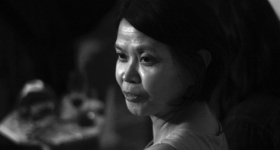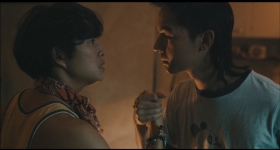THE BLUE SCHOLARS are deeply rooted in the rich Pacific Northwest hip-hop scene. In 2008, they represented their region as they traveled with legendary acts like GZA and Hieroglyphics and on the revered Rock the Bells tour. Interweaving issues of race, class and daily life in introspective rhymes layered over smoothed-out funk beats, the Blue Scholars have been rocking sold-out shows and consistently honing their reputation on both the college circuit and club scene. As Filipino American emcee Geologic and Iranian American DJ/producer Sabzi tell it, the Blue Scholars' distance from the mainstream spotlight is exactly what energizes them to seek out issues and resources that artists in major cities may take for granted. The Blue Scholars have risen to the challenge by developing into heavy-hitting, concept-driven musicians. Love and loyalty are crucial themes In their music, which like their hometown Seattle - tilts left on the political spectrum.
You guys make a lot of Seattle-centric songs, and every region has a distinct type of sound in the hip-hop world. Where do you think the Northwest fits in?
SABZI: I think that has yet to be discovered. There are people who say Seattle has a certain sound, other people who don't think so because nobody there conforms to a homogeneous sound. And we're definitely at a time now where a lot more people are finding their voice or finding a way to get their music heard. And I think there is a lot of lifestyle-not just style-that will be coming from the Northwest, particularly Seattle, and the jury is still out on what will prevail.
Being that you guys are geographically centered in the Northwest, do you think that's hindered your appeal?
GEOLOGIC: Geographically, we're isolated so we have to travel twice as far to get from one place to another.
S: And there is not a lot of industry there, and so the taste makers - the people that are writing for blogs or magazines, doing photos, design, running labels or whatever - are not located in Seattle. That industry is really located in L.A. and New York. There you can spit and hit someone who is doing some kind of work like that. To that extent, there is an illusion that there is more happening in New York and L.A. ... But there is nothing inherently lacking in Seattle and the fact that those two major metropolitan areas have such a big influence on what you see in the media, what's really a local culture there gets represented as the national thing. We're kind of like the neighborhood that nobody knows about, but there is a lot happening. So I think there's that dominating culture from those places, and the fact that nobody from Seattle has made a dent in that perception contributes to people being skeptical of what can come out of our town.
You guys make a lot of politically defining songs. Where do your personal politics differ?
G: I think if you ever put two people in a room and their politics are completely in line with one another, something wrong probably happened. Or somebody's lying. That being the case, what we try and do is find the unity. That's what we're ultimately trying to do with the listeners. It's like, "Here's our observations, take what you will."
S: It's like a Venn diagram. Blue Scholars is where we intersect. Whatever Geo has to say on a track, I may not say it in that way, or I may choose to never say it, but I do believe that a lot of the content that is in our music is relevant and needs to be heard. But I do concretely believe that most of what is propagated out there is one sided. I'm willing to work with a lot of different emcees. I may not entirely agree with what they are saying, but if they are the types of voices that are constantly being silenced, then I'm down to work with them.
Every region in the United States where hip-hop has emerged has had its own social, political and historical backdrop that influenced its music. What would you say Seattle's is?
G: The dwindling number of black people. I mean, hip-hop originating and being the cultural choice of media among black youth might be part of why people are skeptical about Seattle. Because people are like, "There ain't no black people in Seattle; therefore, there can't be a legitimate hiphop scene." Well, joke's on you: There is. But gentriflcation being what it is - really targeting communities of color, immigrant communities and just working-class people in general - there's a class struggle going on in Seattle that isn't being reported on. There's things that may be quintessentially Seattle to me and Saba, but to other people aren't, because all they know is the stereotype shit: the coffee, the grunge, Boeing, Microsoft.
S: - which, to an extent, is there - but there is so much more that's going on.
G: [Seattle] fashions itself as a liberal city where more progressive ideas are, and [the assumption is that] other places are backwards and more racist. But I disagree with that.
S: We have one of the worst police forces in the United States. The level of corruption found in the SPD is comparable to a large city like New York.
G: I don't want to focus on what's different in Seattle. We experience the things that every mid-to-large city in the country experiences. Police brutality, gentrification, working folks not having access to basic human resources, social services, educational issues with the youth[these] are lines I want to draw in common with all other places, but [Seattle] has its own flavor. For one example, the racism is more subtle. You'll never hear "chink" or "wetback," but you hear it in the tone of voice.
So racism is subdued but very prevalent.
S: And the fact that it's subdued actually makes people less critical of their behavior, because they think racist behavior doesn't exist, so they don't have to address it - which is how racist behavior continues and grows.
Geo, you have a solo project in the works called Prometheus Brown. Talk about that and what we can expect.
G: It's still developing. My primary focus is Blue Scholars, but I write a lot more songs than you'll hear on a Blue Scholars record. It's not like I write for Blue Scholars and then sit on my ass. There's a lot of songs I have that need beats and that's where it started coming from. ... When me and Saba started working together, we kind of departed from the styles we were on and met in the middle, which was good for me because, at the time, I was this schizophrenic battle rapper dude. Blue Scholars is very content-based, conceptual type of writing, which was good for me. It fulfills a lot my growth. What's left is just spittin', just spits and riding a beat and playing around with words, rather than trying to make the listeners feel some kind of emotional connection.
It's just another side of you.
G: Yeah, as soon as producers stop shooting me their most Sabzi beat because they think I want that. I know they got other hot shit but they give me their Sabzi impression. I'm like, "Yo, if I want a Sabzi beat, I'll hit him up. Why don't you give me some of your raw shit?"
A born-and-raised "Frisconian, " Joshua Weitz is a certified '80s baby. Between traveling the world, working 50-hour weeks and driving classic cars at top speed, he drops incisive questions on your favorite hip-hop artists.









Comments